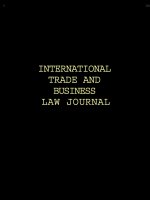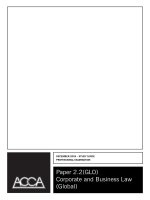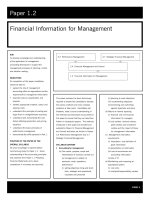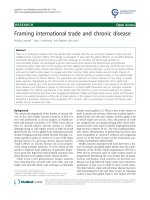International trade and business law, teamwork assignment
Bạn đang xem bản rút gọn của tài liệu. Xem và tải ngay bản đầy đủ của tài liệu tại đây (310.25 KB, 10 trang )
MINISTRY OF JUSTICE
HANOI LAW UNIVERSITY
TEAMWORK
ASSIGNMENT
SUBJECTS:
INTERNATIONAL TRADE AND BUSINESS LAW
QUESTION: 08
CLASS
:
GROUP
:
Ha Noi, 2020
1
BIÊN BẢN XÁC ĐỊNH MỨC ĐỘ THAM GIA VÀ KẾT QUẢ
THAM GIA LÀM BÀI TẬP NHÓM
Ngày
Tại địa điểm: Trường Đại học Luật Hà Nội
Nhóm:
Lớp:
Tổng số sinh viên của nhóm:
Có mặt:
Vắng mặt:
Đề tài nghiên cứu:
Xác định mức độ tham gia và kết quả tham gia của từng sinh viên trong việc thực
hiện bài tập nhóm mơn Thương mại Quốc tế. Kết quả như sau:
S
T
T
Mã SV
Họ tên SV
A
Đánh giá
Đánh giá của giáo
của SV
viên
B
C
Điểm số
1
2
3
4
5
6
Kết quả điểm bài viết: ……….
Hà Nội, ngày tháng năm
-Giáo viên chấm thứ nhất:……..
NHÓM TRƯỞNG
-Giáo viên chấm thứ hai:………
Kết quả điểm thuyết trình:…..
Điểm kết luận cuối cùng:……..
Giáo viên đánh giá cuối cùng:
……………………………………….
TABLE OF CONTENTS
2
Điểm chữ
I.INTRODUCTION...............................................................................................................................4
II. CONTENT........................................................................................................................................4
1.Overview.............................................................................................................................................4
1.1.Legal issue.......................................................................................................................................4
2. The seller is not liable........................................................................................................................6
III. CONCLUSION................................................................................................................................9
LIST OF REFERENCES.....................................................................................................................10
3
I.
INTRODUCTION
Social and economic development requires cross-country exchanges,
especially widespread economic exchanges across the globe. Due to such
trade, cases of international trade disputes cannot be avoided. To better
understand this issue, the dispute case below will be an example for us to
discuss and clarify:
“A seller agreed to ship 100,000 tons of potatoes FOB Tacoma, Washington,
to a buyer in Japan. The buyer designated the SS Russet to take delivery at
pier 7 in Tacoma. On the agreed-upon date for delivery, the seller delivered
the potatoes to Pier 7, but the ship was not at the pier. Because another ship
using the pier was slow in loading, the SS Russet had to anchor at a mooring
buoy in the harbor and the seller had to arrange for a lighter to transport the
potatoes in containers to the ship. The lighter tied up alongside the SS Russet,
and a cable from the ship’s boom was attached to the first container. As the
container began to cross the ship’s rail, the cable snapped. The container
then fell on the rail, teetered, and finally crashed down the side of the ship,
causing the lighter to capsize. All of the potatoes were dumped into the sea.
The buyer now sues the seller for failure to make delivery.
Question: Is the seller liable under INCOTERMS 2010? You are lawyer for
seller. Please write a memo and defend seller orally.”
II. CONTENT
1. Overview
1.1.
Legal issue
Buyer: A
Seller (FOB Tacoma, Washington): B
4
A agreed to buy 100.000 tons of potatoes from B. Shipping date and delivery
place was agreed on an upon date, at pier 7. However, shipping and loadingon-board did not occur on time because another ship was using the pier. Later
than that when all of the goods were on delivering, an accident happened and
all of the potatoes were dumped into the sea. Eventually, A sues B for not
being able to make the delivery.
1.2.
Legal document
- INCOTERMS 2010: FOB - Free On Board: Risk passes to buyer, including
payment of all transportation and insurance costs, once delivered on board the
ship by the seller. A step further than FAS.
Under FOB terms the seller bears all costs and risks up to the point the goods
are loaded on board the vessel. The seller's responsibility does not end at that
point unless the goods are "appropriated to the contract" that is, they are
"clearly set aside or otherwise identified as the contract goods. Therefore,
FOB contract requires a seller to deliver goods on board a vessel that is to be
designated by the buyer in a manner customary at the particular port. In this
case, the seller must also arrange for export clearance. On the other hand, the
buyer pays cost of marine freight transportation, bill of lading fees, insurance,
unloading and transportation cost from the arrival port to destination. Since
Incoterms 1980 introduced the Incoterm FCA, FOB should only be used for
non-containerized seafreight and inland waterway transport. However, FOB is
commonly used incorrectly for all modes of transport despite the contractual
risks that this can introduce. In some common law countries such as the
United States of America, FOB is not only connected with the carriage of
goods by sea but also used for inland carriage aboard any "vessel, car or other
vehicle.
- CISG 1980: Article 74
5
Damages for breach of contract by one party consist of a sum equal to
the loss, including loss of profit, suffered by the other party as a consequence
of the breach. Such damages may not exceed the loss which the party
in breach foresaw or ought to have foreseen at the time of the
conclusion of the contract, in the light of the facts and matters of
which he then knew or ought to have known, as a possible
consequence of the breach of contract.
2. The seller is not liable
2.1.
Transfer of risks
In the 2010 FOB Incoterms contract, the time of transferring responsibility for
goods risks to the buyer coincides with the time the seller delivers the goods
to the buyer. That is when the loaded goods on the ship nominated by the
buyer. However, Incoterms 2010 also stipulates that in some cases the time of
risk transfer may be reversed if the risk occurs due to the buyer error in some
following cases:
+ The buyer does not fully inform the seller of the ship's name, shipping
address and delivery time in the agreed delivery time.
+ The ship appointed by the buyer does not arrive on time so that the seller
may fulfill the delivery obligation as prescribed, cannot receive the goods or
stop receiving the goods before the time of notification to the seller.
The time of transferring risk in this case is determined as follows:
+ From the date of agreement on the delivery and receipt of goods in the 2010
FOB Incoterms contract
+ If there is no agreement on this date, the time of risk transfer shall be
calculated from the date when the seller informed that the ship could not
receive the goods within the agreed time limit; If the seller fails to notify such
a date, the time of transferring the risk shall be counted from the last day of
the agreed delivery deadline.
6
According the given situation, the ship designated by the buyer was not
present on time and at the right place as agreed in the contract made the seller
unable to deliver goods according to the regulations. Because the SS Russet
had to anchor at a mooring buoy in the harbor, the seller had to arrange for a
lighter to transport the potatoes in containers to the ship. Therefore, it is
impossible to determine the time at which the risk is transferred when the
seller has delivered the goods on board in accordance with the Incoterms. It
goes without saying that, the seller doesn´t take responsibility for failure to
make delivery because transfer of risks is not determined at the time the seller
loads goods on board completely.
2.2.
Transfer of ownership
In case the seller is responsible for completing the delivery, but we need to
specify the time of transfer of ownership. The FOB contract does not specify
the time for transferring ownership between the seller and the buyer.
Therefore, if the two parties agreed to transfer the ownership of 10,000 tons
of potatoes before shipping to ships, then the buyer must be responsible for
their goods.
2.3.
Contract of carriage and insurance
- Contract of carriage:
In section A3 section A.The Seller’s Obligation – FOB and section B3 section
B.The Buyer’s Obligation, the contract of carriage has a transportation range
from inland storage to the designated port under the seller 's expense and risk.
The costs and the risks of this contract will end after the goods are delivered
on the ship's rail or the goods are placed on deck, as agreed. The seller has
supplied the goods in accordance with the contract of carriage.
Buyer bears the cost of transporting goods from the named port of destination
to the final destination (Port of discharge or inland warehouse).
7
- Contract of insurance:
In section A3 section A.The Seller’s Obligation – FOB and section B3 section
B.The Buyer’s Obligation, in this case are not mandatory for the seller and the
buyer is not required to buy (unless the buyer wants his goods to be safer.)
The seller will pay for cargo insurance until loading until it is loaded onto the
deck of the ship designated by the buyer at the place of loading at the pier 7.
The buyer covers insurance for the main part of the transport process, that is,
when the potatoes are loaded onto the deck of the pier 7. If the ship arrives
late, the seller may remove the freight at the port of departure. In principle
this is the buyer's responsibility because he has to make sure the ship arrives
at the port on the agreed date.
2.4.
Liability for compensation
Responsibility for compensation is specified in CISG 1980, Unidroit Priciples
and Incoterms 2010. The determination of the compensation liability of the
parties should be based on damages caused by contract breaches.
Article 74 CISG defines damage consits of "a sum equal to the loss, including
loss of profit, suffered by the other party as a consequence of the breach".
Unidroit Principles, meanwhile, identified the losses "includes both any loss
which it suffered and any gain of which it was deprived, taking into account
any gain to the aggrieved party results from its avoidance of cost or harm".
And Incoterms 2010 does not have specific provisions on the determination of
damage. As such, it can be seen that the determination of damage
consequences between CISG and Unidroit is different, but based on actual
damage to determine compensation liability.
In this case, as analyzed above, the damage caused was not due to the fault of
the seller. In particular, the buyer violated the case specified in section B5
section B.The buyer’s Obligation - FOB. Therefore, the buyer had to pay
8
damages according to the obligations stipulated in the international trade
contract.
Payment obligations of buyers in Incoterms include all costs relating to goods
and any additional costs incurred. Specifically, Section B6 states:
“The buyer must pay
a) all cost relating to goods from the time they have been delivered as
envisaged in A4, except, where applicable, the costs of customs formalities
necessary for export, as well as all duties, taxes and other charges payable
upon export as referred to in A6 b);
b) any additional costs incurred, either because:
(i) the buyer has fails to give appropriate notice in accordance with B7, or
(ii) the vessel nominated by the buyer fails to give arrive in time, is unable to
the goods, or closes for cargo earlier tthan the time notified in accordance
with B7, provided that the goods have been clearly identified as the contract
goods, and
c) where applicable, all duties, taxes and other charge, as well as the costs of
carring out customs formalities payable upon import of the goods and the
costs for their transport through any country.”
Thus, in this case, the buyer must pay the amount of goods (100,000 tons of
potatoes) fallen into the sea, along with other cost incurred from this damage
in fact (if any). These incurred amounts will be calculated and agreed upon by
the contract.
III.
CONCLUSION
In summary, through this specific case, we have a better picture of an
international trade lawsuit, cultivating ourselves with practical experience
when playing the role of a lawyer in the lawsuit.
9
LIST OF REFERENCES
1. Textbook International Trade and Business Law, Hanoi Law University
2. United Nations Convention on Contracts for the International Sale of
Goods 1980
3. Unidroit Priciples
4. Incoterms 2010
10









